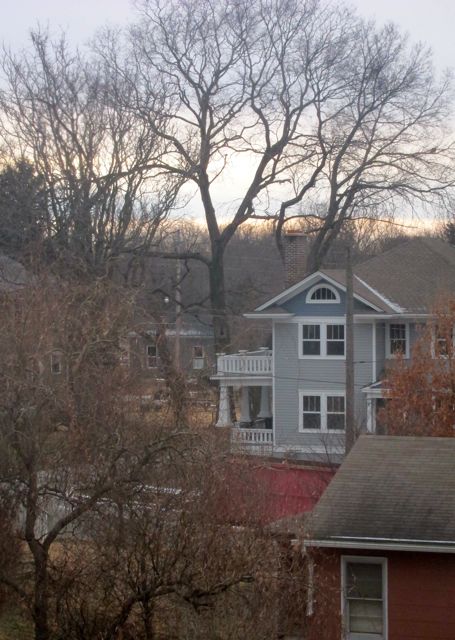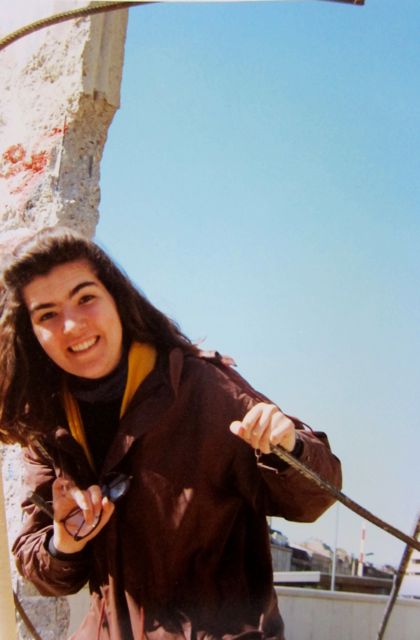
When the Berlin Wall fell in November of 1989, I had recently arrived at the University of Durham for a junior-year-abroad experience. In April 1990, I flew from England to West Germany to visit my friend Bart, a fellow sociology major from a small college in Missouri. After a few days touring Heidelberg, we took a train to Berlin.
Unprepared for the shortage of rooms in this swelling city, Bart and I had to spend our first night in bunk-beds at the train station’s BonHof mission. My pocket-sized journal (slightly edited for clarity) tells the story of the following day and its endless night, starting with a visit to the remains of the Berlin Wall and ending up in East Germany on the steps of the Berliner Dom.
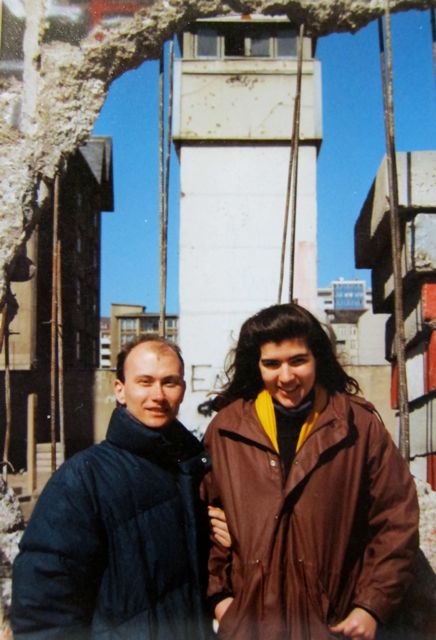
April 10-11, 1990
Early morning Berlin contains East Germans toting piles of DDR currency, Polish people stockpiling electronic goods, Turkish men selling pineapples and kiwis, and Americans chipping at the Berlin Wall with chisels. A Turkish boy gives Bart and I bits of the wall and then climbs behind it to collect more fragments.
I see an East German flag with its communist sickle as we walk beside the wall from Potsdamer Platz to Tiergarten. Foreigners have spray-painted “Fuck the Poll Tax” and “And the Wall Came Tumbling Down” on the vertical concrete. There’s a Roosevelt quotation about glorious victory in neon orange, and someone has crossed out Gorbachev in “Thank-you, Gorbachev” and replaced it with Reagan’s name.
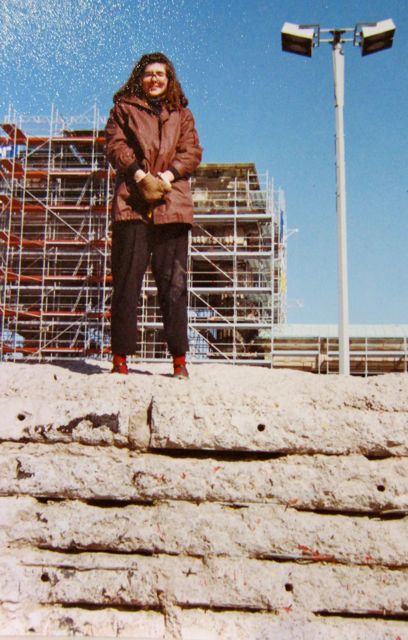
After shuddering at the sight of Hitler’s bunker, Bart and I duck through a hole in the wall and attract some negative attention from an East German guard, who barks “Raus!” As he approaches on his motor bike, scattering the Americans along that part of the wall, it suddenly seems a good time to go admire the Brandenberg Gate. Afterwards, as we walk east along Unter den Linden, we see Soviet tanks by their embassy and a muscular Russian soldier on top of one of them.
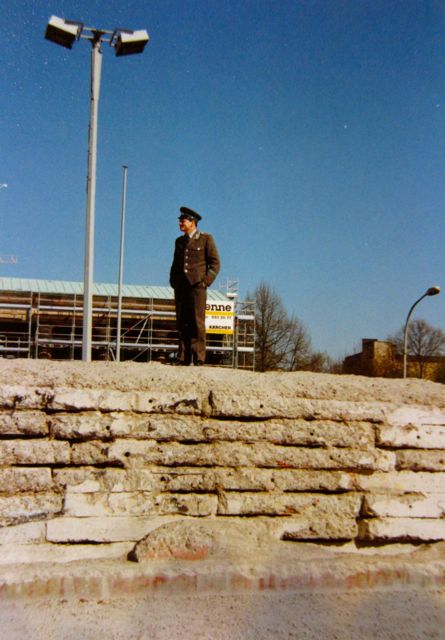
The monument with gold Germania on top attracts us, so we climb it, first looking at the mosaic on the middle of the column. Once we recover from the vertigo caused by climbing so many narrow steps, we take in the panorama of Berlin at the very top. Then we clomp down and Bart goes off to the bathroom, leaving me on the steps to comb my hair and play with the ants in the sun.
As we pass statues of Goethe and Bismarck, I start to worry aloud about where we are going to sleep that night. So Bart goes into a phone booth to call an acquaintance who is living in Berlin. Maybe we can sleep on his floor. Surely he knows how desperately crowded the city is and take pity on us.
While Bart is trying to secure shelter, I wait on a nearby bench. Suddenly, an agitated American matron in a multicolored Day-Glo jacket comes out of another phone booth and gestures at me wildly. She shouts, “Do . . . YOU . . . speak . . . ENG . . . lish?”
Eager to help, I say “Yes, I do” and go over to her booth. She hands me the receiver and commands: “Tell . . . HIM . . . the . . . po . . . LICE . . . have . . . TAK . . . en . . . a . . . WAY . . . my . . . CAR!!!”
So I take the phone and obediently repeat, “The police have taken away her car.” Laughing and mad at the same time, she yells, “No, not in English! In German!”
The story of my mishap cheered Bart a little, but he was shaken by his friend’s refusal to host us. Eventually we had to just stay up all night, roving from McDonald’s, to Burger King, back to McDonald’s, then to the underground and finally the bus. We bought milk, hot chocolate, and small packets of fries to give us the temporary right to stay in the restaurants.
The moment we accepted our sorry condition, we started laughing on a bench outside Kaiser William’s church. Our plight was so hilariously dire that I lifted my legs straight out in front of me, shrugging with my whole body. We considered what we would do for a bed. Sex? Work? Anything. A drunk man lunged at Bart and I. We attracted crazy men, forlorn Poles, and troubles.
The only sleep we got that night was from one thirty to three thirty on the top deck of a bus. We ended up all the way over on the western edge of Berlin, bouncing over cobblestones and deserted roads, while I tried to keep my head on Bart’s shoulder. We had no idea where we were when the bus officials forced us off, shouting “Raus!” and banging on the hand rail leading to the top level. We were spinning into utter darkness without any orientation, comfort, or security. Waiting at the bus stop were three men who remarked on us dryly in an unknown language.
At four o’clock in the morning, we clambered back on another bus. We rode back into the the city, entering a morning world hidden from tourists, the routine of commuters before sunrise. Lonely and shapeless, they waited by the stops in the cold, sleeping on the U-Bahn after they boarded. Watching them loll in their seats, I felt sympathy for sleepy, vulnerable humanity. I wanted to give them all a big blanket.
Bart used his military ID to get on the underground, but I rode illegally and felt guilty. Masses of people were going to work before six in the morning. At an S-Bahn station, I tried to freeze the scene in memory — the sun not yet risen, people in dark jackets gathering on the platform, smoking, yawning. They get on the train and slump over, not caring to impress, stable in the aftermath of war, just riding a train without fanfare.
I welcomed the sunrise with profound relief, and my gratitude for the dusky, snowy dawn made it all the more beautiful. Around seven, after purchasing some chocolate and a croissant (silly me saying “oui” to the lady), we took the U-Bahn to the one East German underground station that is open to the West. The route gave us a view of the East German part of the U-Bahn which had lain in disuse since the war. Bomb damage was still evident, making the empty station booths looked haunted. It was something out of a childhood nightmare — endless empty corridors, dusty and lost.
We rose and went up the stairs to the exit, emerging into a 1950’s world as we joined a stream of people going to East Berlin. Waiting to present our documents, we stood in a corner eating croissants and chocolate, me getting crumbs in my hair. Then we reached passport control, where I paid the ritual 5 marks. (In the past, an American would have had to purchase 25 East German marks and spend them in East Berlin). The line moved quickly. Soon we passed through another maze (like a haunted house, only lit), got our day passes checked, and Lo! we were in the East. Exhausted, we stepped out into the cold morning.
Since most of the museums didn’t open until ten, we wandered around the shopping area for awhile. We studied shop displays that seemed out of date, contrived, sorrowful, the dresses like relics from an old Sears catalog. Why did the shops make me sad? Maybe it was their emptiness, lack of color.
Spacious East, room to be alone because the people are not shopping. Yet there was a Bigfoot jeep on display, reminding Bart uncomfortably of his Ozark hometown, where masculine egos demand such rugged vehicles. People gathered round to stare at the monstrous four-wheeled beast.
We then turned toward the big glass train station, which looked elegantly Victorian from a distance but up-close seemed militaristic, iron-girded and massive. We went lower and lower into the underground, seeking warmth. Shivering, we made a huddle on a high wooden bench, waiting until nine thirty when we could emerge in search of tea.
After about forty minutes, we left our temporary burrow and crossed the square again by the Bigfoot. We went to one shop, but it had no tea. At the next one, our entrance changed the atmosphere. The waiter turned with a smile on his face as the door opened, but when he saw we were Westerners, his happy blue eyes went cold. All the East Germans seated in smoky camaraderie and warmth stared at us, so we left without ordering anything. It was an unhappy awakening for me that people could tell I was Western just by the way I dressed. I had always prided myself on my poor fashion sense, but Bart pointed out how expensive my purple raincoat looked and the confident message my bright yellow scarf sent.

We sat outside in the cold once more, lamenting our outcast state. We were very cold from the unfriendly treatment and the weather, but a grocery store offered diversion until the museums opened. The aisles were huge and the carts incredibly small. Bread was freshly made and lay unwrapped on the shelves. There were no brand names. The few Western items, such as jam and crackers, were priced very high, but the rest were very cheap. Huge sausages, candy, and tins of fruit were available. They wrapped their purchases in blue paper.
Outside, a female employee of the store chased away three young Polish men who were lounging near the entrance. They seemed scared of her — she was quite big and threatening. One tried to bluff and joke with her but the other two were like, “O.K. We’re outta here.”
When ten o’clock finally came, Bart and I walked to the Berliner Dom, where we sat on the steps and ate marzipan. Swooning and unbalanced from lack of sleep, we then toured some of the cathedral (the main part of it wasn’t open). Ornate gilded woodwork impressed us, along with a marble staircase and rich brown marble columns.
Framed photographs on the gray marble walls showed us what Berliner Dom used to look like before the war and then after bombs had struck. The dome smoked. Many days later, this image reappeared in a nightmare. My dream self was looking out the upstairs window of my childhood home in Missouri. The window frame was smoking and I could see the Brandenburg Gate on top of the Lambda Chi fraternity house, all in flames.
